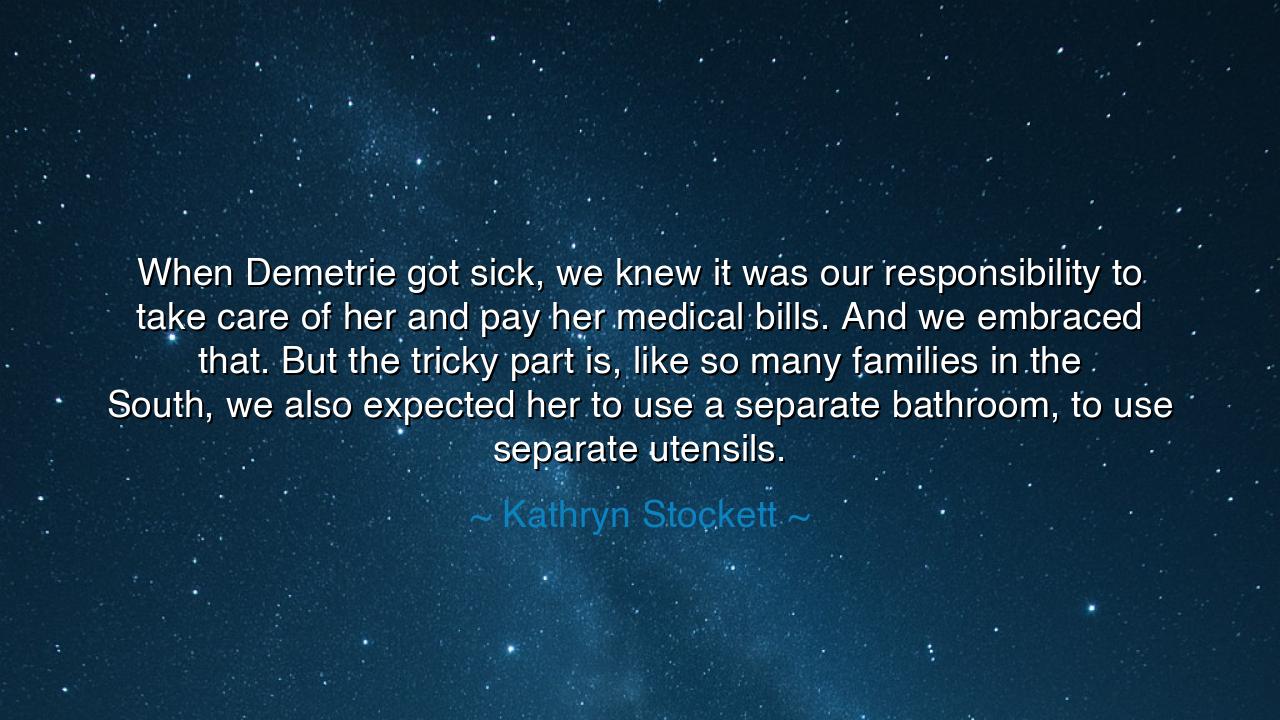
When Demetrie got sick, we knew it was our responsibility to take
When Demetrie got sick, we knew it was our responsibility to take care of her and pay her medical bills. And we embraced that. But the tricky part is, like so many families in the South, we also expected her to use a separate bathroom, to use separate utensils.






Hearken to the words of Kathryn Stockett, whose memory pierces the veils of custom and conscience. She recounts a time when Demetrie got sick, and the family recognized it was their responsibility to take care of her and pay her medical bills. This act, noble and compassionate, reflects the eternal truth that care and duty toward another are hallmarks of humanity. Yet, in the same breath, Stockett illuminates the tricky part—the entanglement of kindness with the rigid customs of the day, when Demetrie was still expected to use a separate bathroom, to use separate utensils. Here lies a paradox, a mirror of human society through the ages: the tension between moral responsibility and entrenched prejudice.
Since antiquity, humans have grappled with the duality of care and custom. In the courts of ancient Rome, slaves were fed, clothed, and tended when ill, yet their lives remained constrained by hierarchy and prejudice. Similarly, in feudal Japan, servants and retainers were provided for, yet strict social boundaries dictated every gesture and space. Stockett’s observation echoes this pattern: the heart may urge compassion, yet society often imposes rules that limit its full expression.
The story of Rosa Parks provides a modern reflection. In her time, the morality of equality clashed with societal custom, and though many acknowledged the humanity of Black citizens, segregation forced physical and symbolic separations. Just as Stockett’s family embraced responsibility yet maintained barriers, history reveals the pervasive struggle of humans to reconcile ethical duty with cultural norms. Compassion, though present, was often constrained by fear, habit, and the weight of tradition.
Stockett’s words remind us that morality is rarely absolute in practice. The human soul may know what is right—care, protection, generosity—but societal conventions can warp its expression. To recognize this tension is the first step toward wisdom. It is a lesson in humility: that even in the act of kindness, humans may fall short of justice if they allow custom to dictate treatment of the other.
In reflecting upon this paradox, we see that care must transcend convenience and prejudice. True responsibility is not only in tending to the physical needs of another, but in honoring their dignity fully. History is replete with examples where partial compassion—care without equality—was insufficient to heal the wounds of oppression. Only when ethics confront custom, and the heart overcomes inherited biases, does true justice emerge.
The lesson for us, then, is to act with awareness and courage. When we assume responsibility for another’s welfare, let it be complete and unconditional, untainted by lingering prejudices or arbitrary separations. Educate oneself on the impact of subtle discrimination, examine the customs we unconsciously uphold, and strive to align care with respect and equality. In this alignment, we honor both the humanity of others and the integrity of our own souls.
Practical actions arise from this reflection: challenge societal norms that perpetuate separation or inequality, advocate for dignity in caregiving, and cultivate mindfulness in daily interactions. Small acts—sharing space equitably, using communal utensils, acknowledging the full humanity of those we serve—are the building blocks of a just and compassionate society. The responsibility of care is sacred, but so too is the duty to transcend inherited bias.
Thus, heed the wisdom of Kathryn Stockett: the measure of compassion is not only in what is done for another, but in how it is done. Let care be whole, equitable, and free from prejudice, that our actions may heal more than the body alone, and cultivate a legacy of dignity, justice, and moral courage for generations yet to come.






AAdministratorAdministrator
Welcome, honored guests. Please leave a comment, we will respond soon